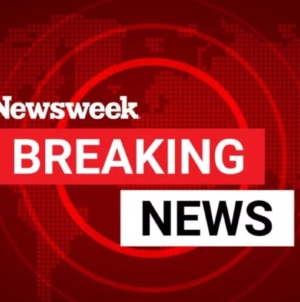-
Multiple Casualties Reported after Car Drives into Crowd in St Louis - 18 mins ago
-
China Hits Back at US Over Nuclear Weapons Alarm - 54 mins ago
-
Honda and Nissan Unveil Merger Talks as Global Competition Bears Down - about 1 hour ago
-
Donald Trump Taunts Panama: ‘Welcome To The United States Canal’ - about 1 hour ago
-
Mets Sign Free Agent Pitcher Sean Manaea to $75 Million Contract: Reports - 2 hours ago
-
‘I Was Destroyed by It’: 4 Men on Abuse at Ireland’s Catholic Schools - 3 hours ago
-
Week 16 Sees Raiders Play Way Out Of Landing Top QB In NFL Draft - 3 hours ago
-
Former WWE Champion Addresses Potential Royal Rumble Return - 3 hours ago
-
Trump and Biden, Make the Hostages Your Priority - 3 hours ago
-
Costco Guys More Popular Than Roman Reigns, Says Former AEW Superstar - 4 hours ago
In 2025, America Needs a New Vision for Politics | Opinion
As 2024 draws to an end, it should be apparent that extraordinary times call for extraordinary political leadership. Candidates running on a platform of normalcy, of maintaining the status quo with a couple of careful tweaks, only prompt exasperated eye rolls from a decisive chunk of the American electorate. Too many of us feel besieged, pessimistic, lonely, anxious, and mistrustful. Among young adults, 58 percent report lacking a sense of meaning or purpose in their lives. Ours is a populace in a slow-moving crisis. Pointing out that inflation isn’t growing so fast anymore and unemployment is pretty low are paths to electoral irrelevance. The future belongs to a different kind of politics.
Some who came of age in a time of relative stability and optimism are skeptical politicians can do anything to restore Americans’ sense of meaning, purpose, and belonging. When U.S. Senator Chris Murphy (D-Ct.) proposed that government should pay attention to these issues, Politico replied with the quietly snarky headline “Sen. Murphy wants to help you make friends.” The next day, National Review followed with one of its own: “The Government Won’t Keep You Warm at Night.”
Such pessimism rightly applies to those politicians who don’t aspire to be leaders at all, but rather slick-talking product managers liaising between their customers (voters), and the engineers (technocratic policy wonks). If that is all political leadership is, the skepticism is warranted. But true leadership is something else. It involves drawing a unique and compelling vision of the future, towards which the rest of us can rally, and in the process engage all of those most natural human capacities—solidarity, mutual care, a deep sense of meaning, and purposeful work that can help give shape to a life and a community.
These visions can take many different forms—a spiritual tradition, a common mountain to climb, a world to discover, a problem to solve. Too often, however, the quickest shortcut to a sense of who we are and what our shared task might be is to find some other to demonize. This strategy temporarily rallies people around shared animosity—perhaps towards woke academics, MAGA supporters, immigrants, Russians, or some other enemy, real or imagined. It can lead to truly awful results, and really only offers a simulacrum of belonging and meaning. But until something better springs up, it will increasingly be an appealing option for would-be leaders to adopt.
This is because the vision that has animated our common life for the last few decades is past its expiry. It has been called the “Washington Consensus,” “Neoliberalism,” “competitive individualism,” and more. We could sum it up as a kind of laissez-faire utopianism, the idea that a society where every individual and institution simply pursues private gain, competing as ruthlessly as possible, and where each individual amassing maximal spoils will somehow add up to a good society for everyone. In this kind of society, “it’s just business—nothing personal” sounds like a reasonable explanation for corporate cruelty. Teachers instruct their students that each of us is responsible to construct and pursue our own private vision of what is valuable and desirable. Shared visions, where we might find a sense of common purpose and identity, have no real place.
That vision is not, it turns out, one that tends towards human flourishing. It leads, in time, to a perception that one lives in a dog-eat-dog, go-it-alone world, where meaning and purpose are either self-soothing fictions or masks for rapacious self interest. There is a strong case to be made that the temporary allure of the laissez-faire model depended heavily on the existential threat of the Soviet Union; as long as we could tell ourselves that all of this manic competition was contributing to the triumph of the Free World over the forces of repression and tyranny, we could feel like it meant something. Many of us no longer feel that way, especially those born too late to remember the terrifying specter of what Ronald Reagan called the “Evil Empire.” We are left to confront the nagging question of who we actually are, and what we care about.
Our moment calls for a new generation of political leadership. There is no single road to a new politics. Different leaders will, by definition, offer different visions; these things are deeply personal—something the leader feels in his or her gut. But we can say a few things about the structure that a workable vision will need to take.

SAUL LOEB / AFP/Getty Images
Any plausible new vision must represent more than mere “opportunity” or a lack of constraints. It must offer a beautiful picture of where we could go, what we could be together. Think here of Martin Luther King Jr.’s call not just to eliminate racism, but to build American society into a “beloved community.”
Such a picture will take on deep human questions. The idea that questions of value and spirituality are private matters, inadmissible to public conversations, is a relic of the dying system. It has facilitated a great deal of evil, for example by suggesting that corporations and government should simply “follow the numbers” towards a maximization of profit and individual choice. A humane society requires that we ask perennial human questions: What does a human life mean? What does it look like to live it well? What kind of world do we want to leave for our children and grandchildren? Leaving these questions unasked opens the door to a mercenary, amoral public life.
A new vision would reject the provider-consumer model of politics and transcend the electoral horse race. Voters are not passive consumers, and real leaders are not product managers. Leaders call ordinary people to action, to virtue, to service, to roll up their sleeves and build something good. Their values are so core to their identity that they would fight and even risk losing an election to stick to their principles. Conviction is charismatic. Focus-grouped pandering is not.
True leaders think past GDP. If anything, high-GDP countries tend to score worse than low-GDP countries on many key metrics of human flourishing, including having a strong sense of meaning, purpose, and community. The next generation of political leaders needs to aim higher and set a course that prizes the flourishing of our communities, not just aggregate wealth production.
A vision for the future will also direct policy efforts toward dismantling the community-destroying infrastructure that has been built up over decades. Many parts of American life—from our blandly technocratic education systems to wages and work patterns that leave workers feeling overstretched and desperate—reflect and encourage a society based on individual competition. We need to remind ourselves that we created this system, and we can remake it.
Policy that allows American communities to exercise shared agency can and should take a million shapes, and vary widely by location. American communities have seen an increasing concentration of power in their professional, financial, political, and technological lives. These monopolizing tendencies must be resisted, and more control should be returned to the local level.
These all may sound like a pipe dream, but our moment requires large-scale change. Small policy adjustments may sound like a more realistic route, but they are actually not. The old system is hemorrhaging credibility, and something genuinely new is bound to emerge. Transitional times like this one can feel disorienting and even dangerous (because they are), but they are also moments of great possibility. The most important political leaders of the coming decades will be those who are willing and able to think creatively, think big, and lead, with courage, into a future we have yet to imagine.
Ian Marcus Corbin is a Senior Fellow at the think tank Capita, and a philosopher on faculty at Harvard Medical School.
The views expressed in this article are the writer’s own.
Source link




















